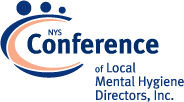NYS Conference of Local Mental Hygiene Directors, Inc. | An Affiliate of the New York State Association of Counties >
Hot Topics / Priority Issues
County Mental Health Commissioners Applaud Governor Cuomo for his Acknowledgement of Rising Mental Health Concerns Due to COVID-19 and Speak to the Critical Need for Restored Funding
The County Mental Health Commissioners are seeing first-hand the devastating toll that COVID-19 is having on the mental health of New Yorkers and we applaud the Governor for his recent public comments acknowledging the growing mental health crisis within in our communities due to the pandemic.
New Yorkers deserve to have adequate access to mental health and addiction treatment services. While we recognize the State’s extensive financial constraints as a result of this crisis, it is imperative that we, as government partners work together to find alternative funding solutions that sustain essential behavioral health treatment programs throughout the State. The counties continue to strongly advocate for emergency federal aid to offset the recent State Aid withholds which devastatingly impacted County Mental Health Department budgets.
“Behavioral health programs have historically been underfunded and challenged to meet the service demand and in this current COVID-19 environment, we are experiencing people that had never before sought treatment which is creating a tremendous difficulty in meeting the current needs, to date Rensselaer County has experienced more than 59 fatal suspected opioid (Fentanyl) related deaths,” said Katherine Alonge-Coons, LCSW-R, Commissioner of Rensselaer County Department of Mental Health and Chair of the NYS Conference of Local Mental Hygiene Directors (CLMHD).
Future cuts to State Aid funding to the Local Governmental Units (LGUs) and the community programs it funds, intensifies the distress of sustaining these critical services. Ongoing funding reductions will all but eliminate capacity that is essential to meet the growing needs in our communities due to COVID-19 and the anticipated long-term mental health impact of the pandemic and corresponding stressors.
Sharon MacDougall, MSW, MBA, MS & LCSW-R, DCS of Cortland County and Chair of CLMHD’s Mental Health Committee said, “Withholding this funding, in the midst of the ongoing COVID-19 pandemic, presents a serious risk to our local programs and directly affects our most vulnerable populations. Additionally, the dire effects of this pandemic, on both mental health and substance use, are dramatic. It is imperative that all resources are in place and accessible as the needs grow in our community.”
More than 40 states have reported increases in opioid-related mortality, as well as ongoing concerns that local governments must increase capacity and services while facing staggering budget deficits. According to a recent report issued by the CDC, 30% of survey respondents reported anxiety or depressive disorders, 26% reported symptoms of a trauma-and stressor-related disorder (TSRD) related to the pandemic, and 10% reported having seriously considered suicide in the 30 days. The need for increased access to behavioral health services is needed now more than ever.
Suzanne Lavigne, MHA, CASAC II, DCS of Franklin County and Chair of CLMHD’s Addiction Services and Recovery Committee, stated, “The pandemic has intensified feelings of anxiety and isolation, triggering a compelling need to use substances in order to live and manage in the current environment. Counties are experiencing a staggering surge in drug and alcohol use. Now is not the time to reduce State Aid funding for vital addiction programs in our communities.”
CLMHD remains laser focused on advocating for appropriate resources needed to facilitate the effective oversight and authority for planning and delivery of these vital services during this crisis. Ruth Roberts, LCSW-R, DCS of Chenango County and Chair of CLMHD's Developmental Disability Committee said, “We have seen first-hand the increased need for services and supports due to the COVID-19 health crisis. Individuals with an intellectual and/or developmental disability are extremely vulnerable members in our communities. Reductions in funding threatens an already fragile and challenging system of care.”
“State Aid withholdings to the LGU and community programs have caused some services to be discontinued and have also contributed to staff layoffs. We have been forced to disband youth services, peer support services, and access to treatment services. At a time when access to varying level of services are needed to aid clients and our community, we are forced to close doors,” said Melissa Stickle, LCSW, CASAC, DCS of Sullivan County.
It is clear New Yorker’s are suffering. Federal intervention is vital for restoring LGU State Aid in order for the County Mental Health Commissioners to preserve their statutory responsibilities to effectively plan for and facilitate essential safety-net programming that our most vulnerable residents, their families and the communities rely on each and every day.
The New York State Conference of Local Mental Hygiene Directors (the Conference) is a statewide membership organization consisting of the Commissioner/Director of each of the state’s 57 county mental hygiene departments (encompassing mental health, substance abuse and developmental disabilities) and the mental hygiene department of the City of New York. The Conference is an affiliate of the New York State Association of Counties (NYSAC).
###
Kelly A. Hansen, Executive Director: New York State Conference of Local Mental Hygiene Directors
An Affiliate of the New York State Association of Counties
41 State St., Suite 505, Albany, NY 12207 (518) 462-9422 FAX (518) 465-2695 E-MAIL: clmhd@clmhd.org www.clmhd.org



